Dr. Maria-Jose Cervantes Mendez, D.D.S., M.S., is hesitant to be singled out for her work in the Pediatric Dentistry Clinic, because the littlest patients in her clinic often require a team approach.
Parents of babies as young as two weeks old find their way to the UT Health Science Center San Antonio, where cleft teams at Methodist Hospital and the Children’s Hospital of San Antonio assist with a treatment plan. Often, families are still coming to terms with the diagnosis when they come to see the cleft team, said Dr. Cervantes Mendez, who is assistant professor/clinical in the Department of Developmental Dentistry, Division of Pediatric Dentistry, at the UT Health Science Center San Antonio.
“We go from there,” she said. The teams explain nasal alveolar molding, a process where a tiny oral appliance or a special tape attached to the lip can be used. Both stretch the lip, nose or palate. The goal is to reduce the cleft gap before going into surgery. “We try to reshape their alveolar and nasal segments prior to the primary lip repair surgery so there’s a better result. This molding can reduce the number of future reconstructive surgeries,” she said.
“There are very few places that offer that level of comprehensive care, it is very specialized, and it is sometimes overwhelming to parents and health care providers,” Dr. Cervantes Mendez said.
A cleft team includes pediatric dentists, two plastic surgeons, an orthodontist, social workers, a speech pathologist, which gives families a cohesive team for comprehensive care. Treatment, which may involve multiple surgeries and orthodontia, can last until early adulthood.
At one time, there were seven babies in the process of having clefts repaired in the UT Dentistry clinic. The team set up one morning a week for the visits, and it became a mini-support group for the families.
“Parents would chat and check in with each other’s progress,” she said. “They’d talk about how the appliance worked, how to cope with it, how to feed the children and how to manage the diagnosis as a family.”
That need to listen to parents, to anticipate the emotional needs of children going through even the most routine dental procedure, is what compelled Dr. Cervantes Mendez, the daughter of dentists, to enter the field of pediatric dentistry.
“It’s required that you be a little funny, you be a little silly sometimes; it’s a different personality as a specialty,” she said. “We’re advocates for kids."
As a pediatric dentist, she sees what happens to children whose parents, for a variety of reasons, do not understand the importance of brushing teeth, a healthy diet and regular dental checkups.
“If you can prevent disease and everything stays good and healthy, it’s better for the patient, better for the parents, less expensive, and the end run you have better health,” Dr. Cervantes Mendez said.
“It’s a much faster-paced treatment,” she explained. “You can’t expect a kid to sit with their mouth open for two hours. You have to be really good at what you do. You have to deal with changing structures. It’s very fun, very rewarding, when you have that kid who gives you a hug and they mean it.”
Dr. Cervantes Mendez didn’t intend to become a dentist. She grew up in her parents’ dental practice and was convinced she wanted something different.
“I think I always liked it, but I always said I wouldn’t be a dentist; it was a little rebellion, I guess,” she recalled. She held firm to her decision. “I was all ready to enroll in college to study accounting, when I decided I might just try the dentist thing out.”
Once she committed to dentistry, she knew she would be a pediatric dentist.
“I love working with children, doesn’t matter where, be it service, camps or mentoring. Pediatrics is completely different. You have to treat the kids, their maturity. You deal with the whole family; you are dealing with their whole environment.”

